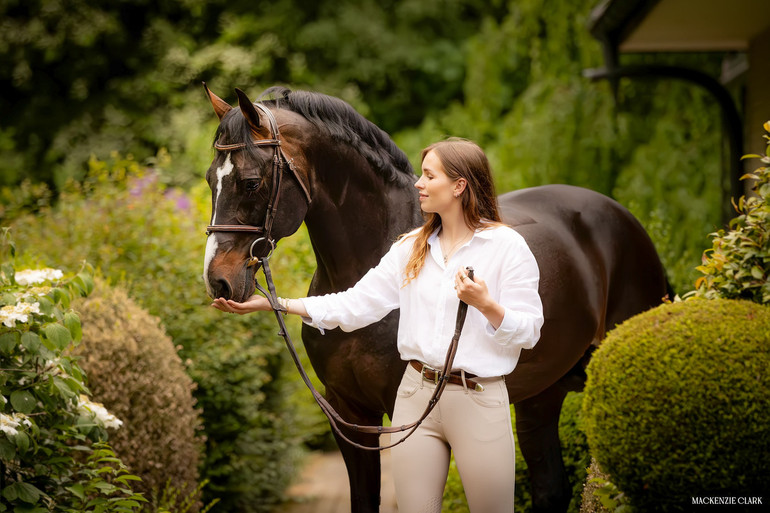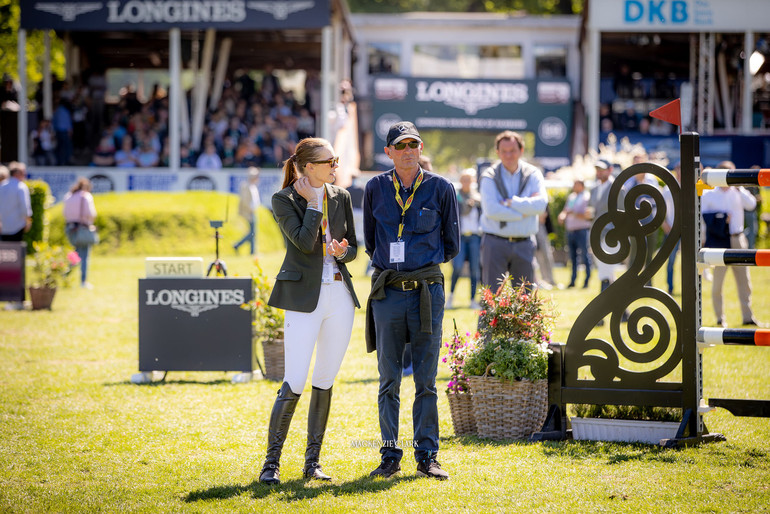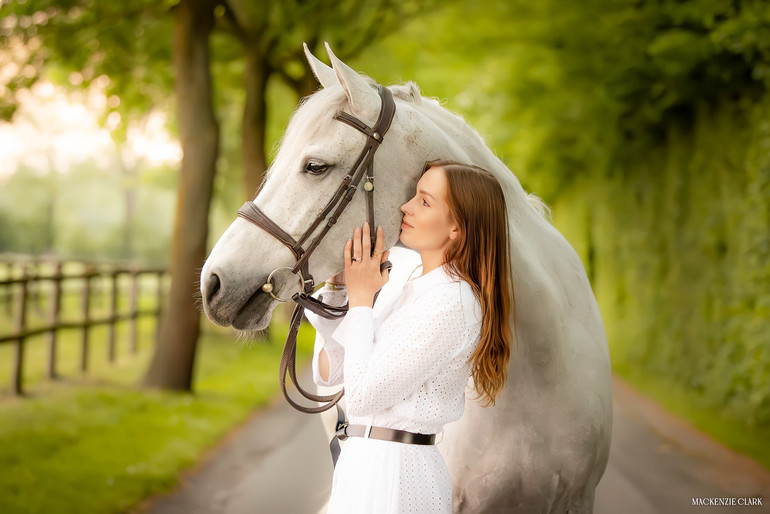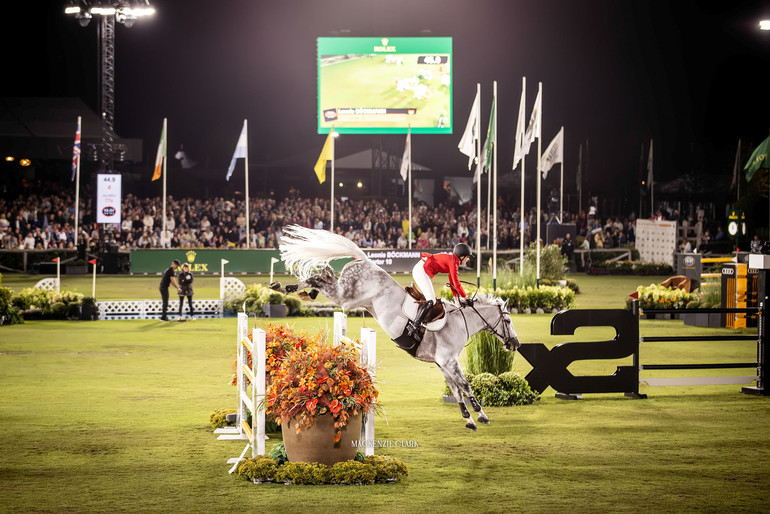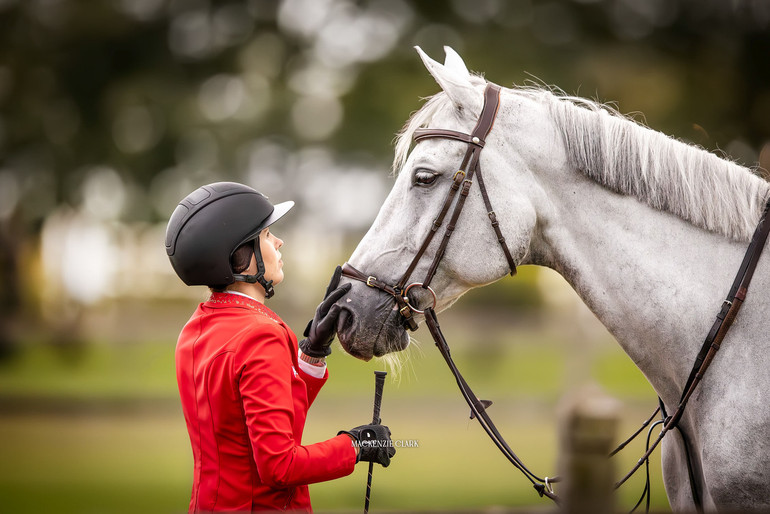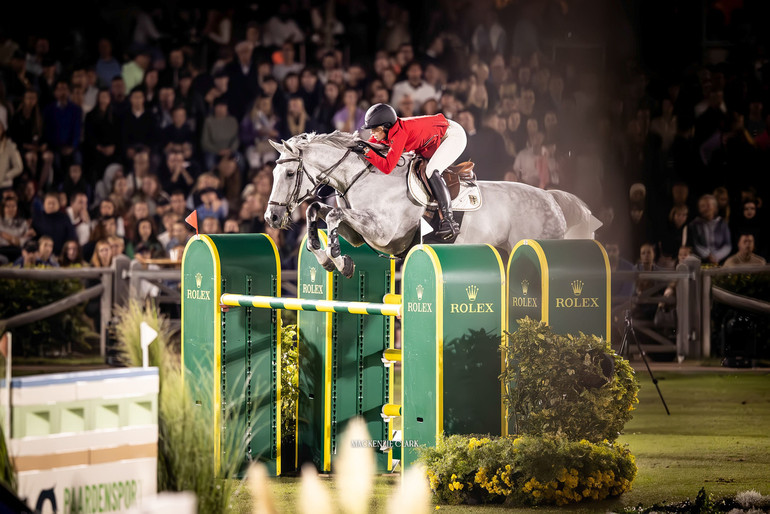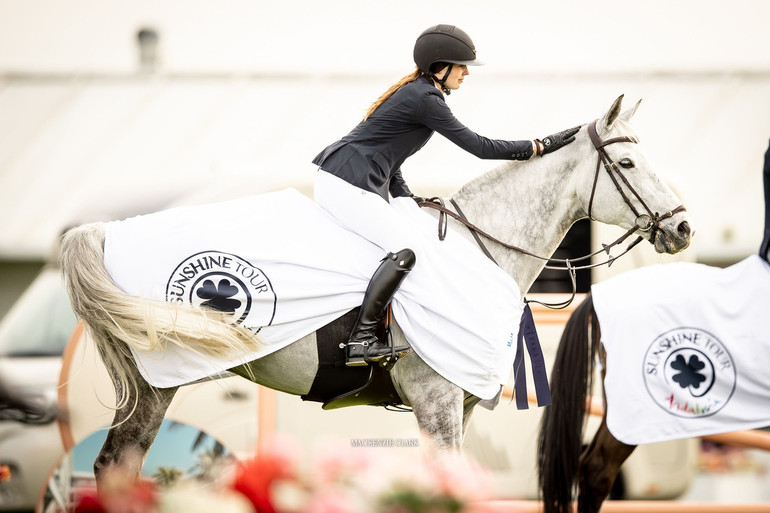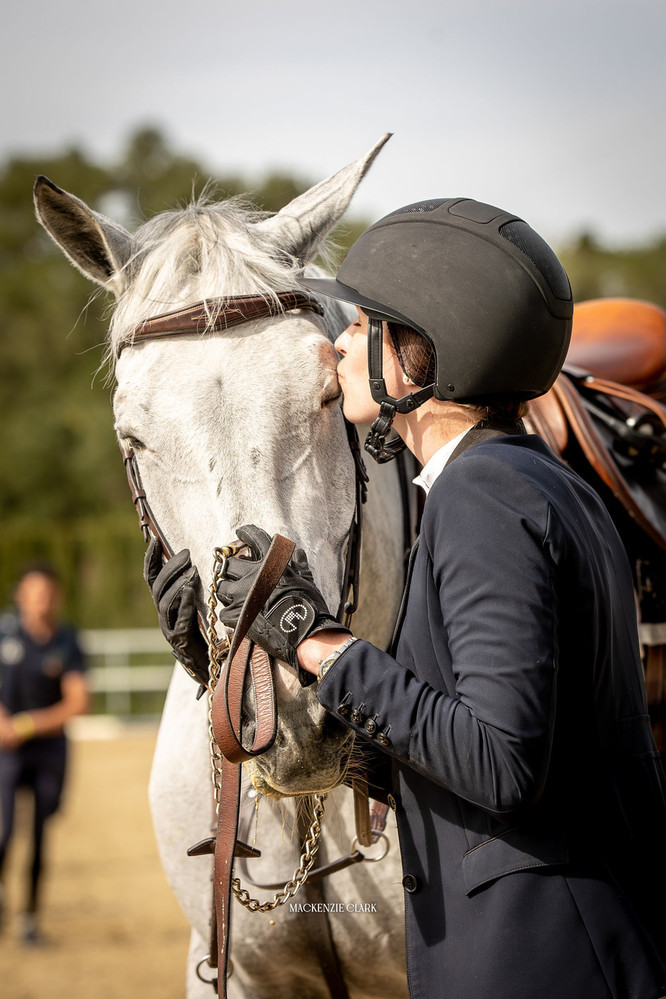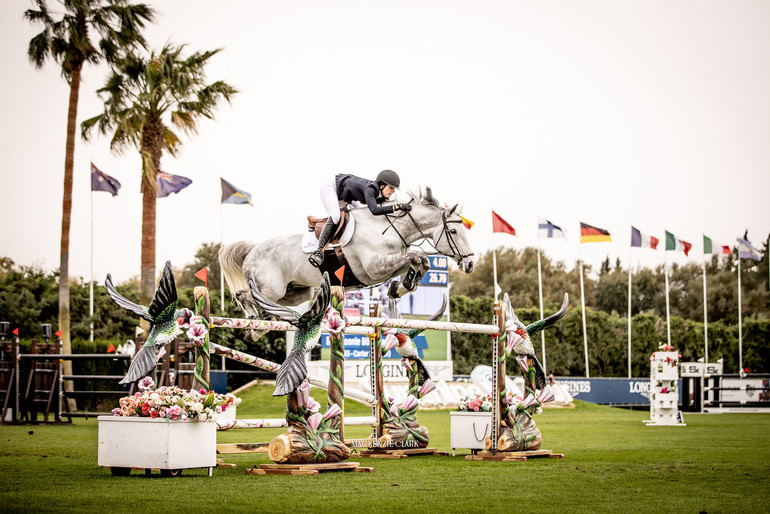Text © World of Showjumping
“What I've learned this year is that the most important thing is to always look back at the progress you and your horse have made, and not compare nor focus on a single result,” Leonie Böckmann tells World of Showjumping about her breakthrough season of 2024.
During the past year, the 25-year-old has stepped up to five-star level, making her debut on the German senior team in the Henders & Hazels CSIO5* Nations Cup at the Brussels Stephex Masters. “It started in the spring,” Leonie tells. “My horse Carter was jumping great; everything just fell into place and weekend after weekend there was another opportunity. It was great to ride on that wave and jump my first five-star Grand Prix and five-star Nations Cup. As I was doing it, I tried to keep the process exactly as before and not do it all as only a means to an end. My horse doesn't know that suddenly he's jumping a five-star class; he can only work with what I give him.”
Throughout her life Leonie has been trained by her father Gilbert, and she is based at the Böckmann-family’s yard in Lastrup, Germany. “I do have to give credit to my mum for going to my very first shows with the ponies,” Leonie laughs when explaining the family dynamics. “My dad couldn't do it; he was terrified of the wild ponies running around in the crowded warm-ups. Afterwards, it has only been my dad that has trained me, which is something very special. Now, when I jump in the warm-up, I already know what he wants to say before he even opens his mouth.”
After finishing school at 18, Leonie went to Wellington for a season, to get away from home and to gain experience. Taking one horse with her, she trained with another German legend; Markus Beerbaum. “I wanted to do something on my own,” she explains.
It has so much meaning for the whole family; it is an entire legacy my family has built throughout their lives
“I'm also very lucky to constantly have help from one of my best friends, Maximilian Lill, who was based at our stable for six years,” Leonie continues. “For me, training has always been more of a family and friends situation, and I think I am fortunate. It is easy to have trainers that you don't know and end up in situations you can’t trust. I always had a very safe feeling about the people around me. Sometimes it can be challenging as well; obviously you might say things to a family member that you wouldn't tell someone that you pay. However, I think maybe something better comes out of it because we actually all care about each other.”
Being based at the yard her grandparents Anton and Brigitte built is not the only way Leonie has carried on a family legacy; the horses she rides are all bred at home and related to horses her father used to compete with. “At the moment, I have a very special group of horses,” she tells. “Most of them we bred ourselves, and they are all related in some way. It has so much meaning for the whole family; it is an entire legacy my family has built throughout their lives.”
Exploring the world outside of horses
While the Böckmanns have created a lasting legacy in Lastrup, choosing riding as a career path was never pushed upon Leonie – quite the opposite in fact. “For my parents, it was very important to put school first. I went to the Humboldt University of Berlin to study philosophy and political science as an undergraduate and did a semester at NYU in New York. I wanted to seriously find out how not riding for over half-a-year would make me feel, I wanted to consider that life as well. For me, life has always been school, homework and riding, with not so much time to do anything else. As a young person growing up, that does shape you. I enjoyed my time in New York and I believe it was a very important experience, but I did go back to riding.”
I try to find a balance
However, Leonie did not abandon her studies; she currently attends law school in Hamburg. “A lot of that can be done from home,” she explains about her daily routines. “I try to find a balance. Studying is refreshing because I believe it is good to leave the horse bubble every now and then and reflect on what's happening in the world outside of horses – and I really enjoy being part of the civilization outside.”
You struggle, you learn
Growing up in a family strongly rooted in horsemanship, Leonie considers herself blessed for the knowledge she has inherited. “At home, there was always huge focus on flatwork,” she points out. “As a rider, you have to be able to actually work the horses the way you think you ride in the course and develop them so they get better while you learn together. That is something that should have more emphasis these days, because who is a good rider in the end? I think there is a big difference between being a good rider and a good pilot, it's not only about jumping clear. Basic flatwork skills are very hard to learn and a great asset to have. Obviously, anyone who jumps clear is good at what they do, but I think that it's important to have a wide base of knowledge. Every rider should know how to treat their horse if they get hurt, or what to work on at home if they had trouble in the course.”
I think there is a big difference between being a good rider and a good pilot, it's not only about jumping clear
“If there's a problem, work through it and don’t give up right away – which is the hardest part,” she continues to tell about the philosophy she grew up with. “I think you learn the most when you struggle. That should be more important for young people, because so many horses are simply bought and given. I think in order for the sport to have a little bit of that identity that I have learned from my parents and grandparents, it would be important for riders to take a step back and actually sit on a young horse, understand the processes and the bigger picture and not only travel from one five-star show to another.”
Did they accidentally call the wrong person?
This summer, Leonie jumped her first five-star Nations Cup at CSIO5* Brussels Stephex Masters. “Honestly, that weekend in Brussels still feels very surreal to me,” she recalls. “The day of that Nations Cup was my birthday as well. It felt like everything fell into some weird place that I never imagined I could even be in. On my way to Brussels, I called my dad and asked if he was sure that the federation had not accidentally called the wrong person. I felt a lot like an impostor working towards that week; thinking about jumping on a team with Daniel Deusser – who I've watched on TV growing up – was surreal.”
On my way to Brussels, I called my dad and asked if he was sure that the federation had not accidentally called the wrong person
“I was actively reminding myself to not do something that I've never done before,” Leonie continues to explain about her coping skills for the exciting weekend. “As I arrived in Brussels, it all got easier; I was with my horses, I saw a few of my friends, I said to Daniel ‘Oh my God, I'm going to jump in the team with you’ – and he laughed. When I walk the course, I forget everything else in the world, like only that moment matters. In the Nations Cup, putting on that red jacket gave even more meaning to it all. As soon as I had walked the course and sat on my horse, I felt very much in my zone and connected to what I wanted to do – and I forgot the rest. That's the best part about riding; on a horse, suddenly everything doesn't seem so complicated anymore.”
Carter 10 – the most loyal horse
It was with the 11-year-old Carter 10 (Christian 25 x breeding unknown) that Leonie stepped up to five-star level. “He's very, very special,” she tells about the home-bred gelding out of her father Gilbert's former Grand Prix-mare No Father's Girl. “From he was born, he was always very big and lengthy. Growing up, he was never flashy; you would not stop for him in the warm-up. As a youngster, he was ridden by a few of the riders that worked at our farm. However, my dad always thought that he was special, because no matter how he jumped and how funny he was with his hind end, he was always careful. He just didn't want to have rails and he rarely did. Two years ago, I sat on him in the winter and then straight away took him to Spain.”
“He is a very spooky horse; wherever he goes, he will jump away to the side at the sight of basically anything,” Leonie described Carter’s personality. “He really is the definition of an elephant being scared of the mouse, and you do always need to be with him and tell him he can do this. However, in the ring, as soon as he gets going, he is the most loyal horse you could meet.”
“I am so looking forward to my younger horses turning eight next year, because I've worked with them for so long,” Leonie continues to tell about her string of horses and her plans for the future. “With Carter, I really just want to keep going on the trajectory that we are on. I am going to jump my last U25 show this year in Geneva. I thought it would be great to have this as a last hurrah, so I'm working towards that at the moment.”
“Success really is in the details,” Leonie points out. “There are things that I have to work on myself; stay strong and fit, work on my position, keep going back to the basics with my horses to be more consistent. With horses, I hate pointing out long-term plans with shows I want to go to, because I can't say right now what place my horses will be at in a few months’ time. Obviously, long-term, I'd love to go to championships, but to do that, I first have to perform consistently.”
What unites us all
“One thing that connects all of us in the end is the love for horses and love for the sport,” Leonie says about the showjumping community. “I do think it's quite an extraordinary bond that we share because there are so many different characters, but in the end, we can always sit at a table together – which I find very impressive. There's always something we can talk about, because despite growing up in different countries and cultures, working with horses is something we all have in common, and something that unites us all.”
One thing that connects all of us in the end is the love for horses and love for the sport
“Sometimes it could be necessary to take a step back and think about the roots of our sport,” Leonie continues. “When I hear the amazing stories my dad tells with his friends, it sounds very fun. It sounds like in the past, people were really working together, which I think we could use more of today. These days, there is so much money in the horse world, that it can easily get demotivating if you start to think about the prices of horses and who can afford them. I think it's important to separate the economical side from the actual love for the sport and the horses. Developing horses and creating bonds with them is much more important than talking about who bought what horse and for which price. There is no point to be jealous of anyone.”
Bureaucracy vs. horsemanship
When it comes to the future of the sport, Leonie believes that bureaucracy and horsemanship are not a match made in heaven. “There are things that you can’t really explain to someone who has never worked with a horse,” she says. “Given what has happened throughout the last years, it’s definitely important that federations and stewards do step in. From a bureaucratic perspective, I understand that you have to send a clear message that animal well-being is our number one priority – which for any horse person it obviously is, because this sport can only be done with a happy, healthy horse that wants to work with you.”
“However, I think that the horsemanship perspective and the bureaucratic perspective can at times be very hard to fit together. An accidental scratch from a spur compared to someone actually hurting their horses are two very different things, and while it is understandable that from the outside any blood looks bad, there should be more proportionality in the rules. It seems that those making bureaucratic decisions maybe don’t understand that protecting the sport from outside criticism actually does not protect the horses’ well-being,” Leonie continues.
It seems that those making bureaucratic decisions maybe don’t understand that protecting the sport from outside criticism actually does not protect the horses’ well-being
“Stewards and judges should be seen as people who are there to protect the existence of the sport, not as the riders’ enemies,” Leonie points out. “However, if the rules we have to work with were more understandable for everyone involved and not so random, maybe then it would be easier to have better communication. In the end, everyone is just trying to do their jobs the best they can.”
“Working with horses and trying to constantly understand them is the most special part of our sport,” Leonie concludes. “You have to be empathetic. Personally, I feel the most myself when I'm on a horse. I'm not very good at getting a horse and jumping a course straight away. I think every rider has their specific talents and mine is trying to create a bond with my horses, getting to be a team with them and working with them. Obviously, I love having success as well but I really enjoy the process – because that's the only way I know.”
19.11.2024 No reproduction of any of the content in this article will be accepted without a written permission, all rights reserved © World of Showjumping.com. If copyright violations occur, a penalty fee will apply.



